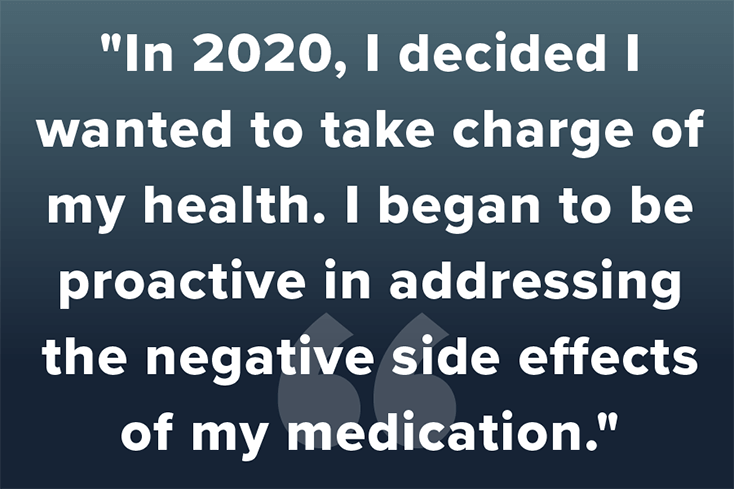December 01, 2022
By Crystal Peng

During finals week in my junior year of high school, I was taking my statistics exam when suddenly, I decided to “take off” and exit the testing area. That was my breaking point. My memory was poor, my concentration and focus weakened — and I was depressed and anxious. In the weeks leading up to this breaking point, my behavior had changed. I found myself on edge and startled easily, even by my friends approaching me. I had little interest in anything; I mostly spent large amounts of time on my phone. This streak of uncharacteristic behavior continued through the rest of my high school years.
After some time, I knew that I needed to seek medical help. When I began university, I started seeing a nurse practitioner with a specialty in mental health. Within a few years of our work together, I was first diagnosed with depression, then bipolar disorder and, finally, schizophrenia. I also began taking medication to manage my symptoms.
Honestly, there were times when I questioned whether my diagnosis was correct, but I continued to take my medications and trust that recovery is an ongoing process. Even though I did not always recognize a difference in my day-to-day activity, my friends and family noted that the medications improved my mood and functionality.
Naturally, there are pros and cons to taking medication, and I had to cope with certain side effects. For example, when I was tired or nervous, my eyes would roll upwards uncontrollably. This strain on my eyes can be painful. I also struggled to manage rapid weight gain since beginning medication — a side effect that was a constant challenge throughout my years in university. I also battled constant fatigue and struggled to motivate myself.
In 2020, I decided I wanted to take charge of my health. I began to be proactive in addressing the negative side effects of my medication. I learned that my eye movements could be resolved with eye muscle therapy. I started making healthier food choices and focusing on my physical well-being. Instead of eating sweet or salty junk food in my spare time, I would find intellectually stimulating or nourishing activities to do, like reading or sipping tea.
I started cultivating hobbies that have, I believe, helped improve my mood, raised my energy levels and allowed me to be more social. Now I enjoy hiking, gardening, crocheting, drawing and playing violin. While combatting fatigue is always a challenge, I find that I feel more motivated to begin my day if I feel like I have a purpose and something to look forward to. This motivation comes from the activities that I love and the opportunity to make meaningful social connections. By far the most rewarding part of my recovery journey has been making meaningful friendships. I have also found comfort in frequent walking and prayer.
An essential part of my recovery journey was finding what worked best for me — and this process can be difficult. But I encourage those who are struggling to take the time to find the activities that bring you joy and peace. Whether it’s taking a walk and getting fresh air or finding a good book to read — embrace your options and don’t give up. Things can and will get better.
We’re always accepting submissions to the NAMI Blog! We feature the latest research, stories of recovery, ways to end stigma and strategies for living well with mental illness. Most importantly: We feature your voices.
LEARN MORENAMI HelpLine is available M-F, 10 a.m. – 10 p.m. ET. Call 800-950-6264,
text “NAMI” to 62640, or email. In a crisis, call or text 988 (24/7).